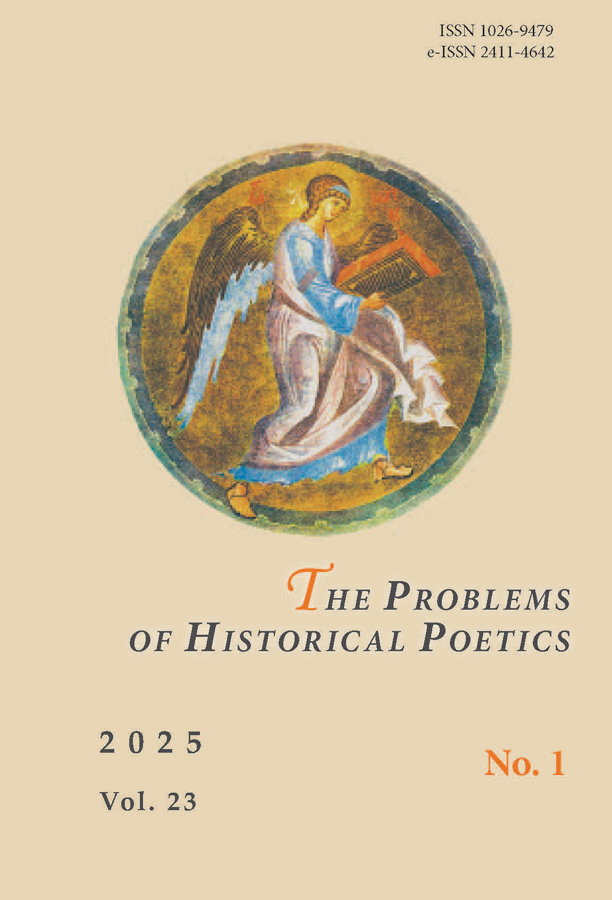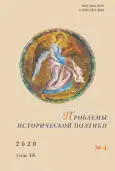Poetics of the new year verse cycle by M. V. Isakovsky (comparative and typological aspects)
- Authors: Petrov A.V.1
-
Affiliations:
- Nosov Magnitogorsk State Technical University
- Issue: Vol 18, No 4 (2020)
- Pages: 306-330
- Section: Articles
- URL: https://bakhtiniada.ru/1026-9479/article/view/286027
- DOI: https://doi.org/10.15393/j9.art.2020.8503
- ID: 286027
Cite item
Full Text
Abstract
Six New Year (eonic) poems by M. V. Isakovsky, written between 1942 and 1972, are examined in the article as a non-author’s cycle with its own ‘plot’. It captured such philosophical phenomena as death, guilt, suffering, chance, etc., which revealed themselves in a sacred moment of time — the New Year. The three “battlefield” toasts reflected Isakovsky’s sense of guilt before himself and the people; the desire to cast a spell on hostile forces and thus bring victory closer. The humorous post-war toast of 1948 demonstrated the return of life in the USSR to a peaceful track, which was signified by the restoration of state and family holidays, dinner parties. The official ‘newspaper’ toast “for 1958” expresses the idea of “new happiness” that emphasizes the motive of peaceful labor exploits of the Soviet people, while the poems “for 1973” can be classified as confessional. Isakovsky’s New Year poems are also analyzed in the context of two traditions — Russian aeonic poetry and ritual toasts. Connections with poems by V. A. Zhukovsky, P. A. Vyazemsky, M. I. Tsvetaeva, A. T. Tvardovsky are traced. New Year poetic toast, on the one hand, became one of the many genres that contributed to the unity of the Russian people in the face of mortal danger during the war; on the other hand, it preserved a number of archaic topoi (the experience of the New Year’s transition as a sacred time; ritual magic formulas that invoke Death, Time and Fate; the biblical archetype of the chosen people, etc.).
About the authors
Aleksey V. Petrov
Nosov Magnitogorsk State Technical University
Author for correspondence.
Email: alexpetrov72@mail.ru
Doctor of Philology, Professor of the Department of Linguistics and Study of Literature
Russian Federation, pr. Lenina 38, Magnitogorsk, 455000References
- Anninskiy L. A. Vek moy, zver’ moy…: russkoe, sovetskoe, vsemirnoe svidetel’stvo stikha [My Century, my Beast…: Russian, Soviet, Worldwide Evidence of Verse]. Irkutsk, Sapronov Publ., 2004. 656 p. (In Russ.)
- Barutkina M. O. Motif of the Prayer for the Cup in Russian Poetry During the Great Patriotic War. In: Ural’skiy filologicheskiy vestnik. Seriya: Draft: Molodaya nauka [Ural Philological Bulletin. Series: Draft: Young Science], 2018, no. 5, pp. 82–90. (In Russ.)
- Darenskiy V. Yu. War as a Spiritual Initiation: Existential Archetypes in Russian Poetry About the Great Patriotic War. In: Vestnik Samarskoy gumanitarnoy akademii. Seriya: Filosofiya. Filologiya [Bulletin of the Samara Academy for Humanities. Series: Philosophy. Philology], 2014, no. 1 (15), pp. 90–108. (In Russ.)
- Dobrenko E. The Art of Hate: “Noble Rage” and Violence in Soviet Culture During Second World War. In: Russkaya literaturа, 2019, no. 3, pp. 217–228. (In Russ.)
- Zheleznyy A., Shemeta L. Pesennaya letopis’ Velikoy Otechestvennoy voyny [Song Chronicle of the Great Patriotic War]. Kiev, Sovremennaya muzyka Publ., 2010. 266 p. (In Russ.)
- Kashkina L. I. Traditions of Russian Oratory in V. A. Zhukovsky’s Civil and Patriotic Lyrics. In: Zhukovskiy i literatura kontsa XVIII–XIX veka [Zhukovsky and Literature of the End of the 18th–19th Century]. Moscow, Nauka Publ., 1988, pp. 132–152. (In Russ.)
- Kukulin I. V. Poetry of the Soviet Subjectivity: 1930–1941. In: Filologicheskiy klass [Philological Class], 2014, no. 1 (35), pp. 7–19. (In Russ.)
- Petrov A. V. Novogodnyaya poeziya v Rossii: ot Trediakovskogo do Benediktova [New Year’s Poetry in Russia: from Trediakovsky to Benediktov]. Magnitogorsk, Magnitogorsk State University Publ., 2009. 267 p. (In Russ.)
- Petrov A. V. M. I. Tsvetaeva’s New Year’s Verses and Traditions of the Russian Eonic Poetry. In: «Esli dusha rodilas’ krylatoy…» Materialy VII Mezhdunarodnykh Tsvetaevskikh chteniy v Elabuge [“If the Soul Was Born Winged…”: Proceedings of the 7th International Tsvetaeva Readings in Elabuga]. Elabuga, ElTIK Publ., 2015, pp. 222–238. (In Russ.)
- Petrov А. V. A. V. Koltsov’s “On New Year 1842”: An Experience of the Contextual Reading of “The Last Poem”. In: Libri Magistri, 2018, issue 5, pp. 48–59. (In Russ.)
- Poslednee stikhotvorenie 100 russkikh poetov XVIII–XX vv. [The Last Verse of 100 Russian Poets of the 18th–20th Centuries]. Ekaterinburg, Ural Federal University Publ., 2011. 552 p. (In Russ.)
- Poeziya Velikoy Otechestvennoy voyny: estetika, problematika, zhanrovostilevye tendentsii [Poetry of the Great Patriotic War: Aesthetics, Problems, Genre and Style Trends]. Tomsk, Tomsk State University Publ., 2016. 136 p. (In Russ.)
- Radionova A. V. Liro-filosofskiy metatekst v russkoy literature: dis. … d-ra filol. nauk [Lyric and Philosophical Metatext in Russian Literature. PhD. philol. sci. diss.]. Smolensk, 2019. 454 p. (In Russ.)
- Reyser S. A. Russian God. In: Izvestiya Rossiyskoy Akademii nauk. Seriya literatury i yazyka [The Bulletin of the Russian Academy of Sciences: Studies in Literature and Language], 1961, no. 1, pp. 64–70. (In Russ.)
- Sotsrealisticheskiy kanon [The Socialist Realist Canon]. St. Petersburg, Akademicheskiy proekt Publ., 2000. 1040 p. (In Russ.)
- Sherdyukova A. A., Petrov A. V. A. T. Tvardovsky’s New Year Verses: Comparative, Historical and Communicative Aspects of Analysis. In: Student i nauka (gumanitarnyy tsikl) — 2020 [Student and Science (Humanitarian Cycle) — 2020]. Magnitogorsk, Nosov Magnitogorsk State Technical University Publ., 2020, pp. 1425–1432. (In Russ.)
- Shulezhkova S. G. «I zhizn’, i slezy, i lyubov’…» Proiskhozhdenie, znachenie, sud’ba 1500 krylatykh slov i vyrazheniy russkogo yazyka [“And Life, and Tears, and Love…”: The Origin, Meaning and Fate of 1500 Winged Words and Expressions of the Russian Language]. Moscow, Flinta Publ., Nauka Publ., 2011. 848 p. (In Russ.)
- Yaspers K. Vvedenie v filosofiyu [Introduction to Philosophy]. Minsk, Propilei Publ., 2000. 192 p. (In Russ.)
Supplementary files











